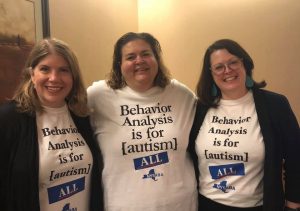 Faculty members of Daemen University’s Behavioral Science Department recently helped pass legislation to amend New York’s State Education Law, allowing licensed behavioral analysts to treat individuals outside of just those with Autism Spectrum Disorder.
Faculty members of Daemen University’s Behavioral Science Department recently helped pass legislation to amend New York’s State Education Law, allowing licensed behavioral analysts to treat individuals outside of just those with Autism Spectrum Disorder.
This change was made, in large part, due to seven years of leading the work and advocacy by Daemen Behavioral Science faculty members, many of whom are on the board of the New York State Association for Behavior Analysis (NYSABA).
“Summed up, this law removed the restriction for our scope of practice in New York State,” said Vicki Mandus Knapp, associate professor, executive director, and chair of the Daemen University Behavioral Science Department. “We have only been able to treat those with ASD, and now we can help so many other individuals who can benefit from our services.”
As of June, 2023, licensed behavior analysts in New York State will be able to work with individuals with significant needs, including those with Down Syndrome, anxiety, depression, brain injury, attention-deficit/hyperactivity disorder, dementia, obsessive-compulsive disorder, learning challenges, and trauma.
“Over the years, we have seen many families and other professionals desperate to include the services of a behavior analyst as part of their interprofessional teams, but could not. Now, we will finally be able to help them,” said Deborah Napolitano, associate professor in the Daemen’s Behavioral Science Department.
In addition to benefiting patients, the law provides expanded career opportunities for current and aspiring licensed behavior analysts in New York State.
“Daemen ABA graduates who pass their licensure exam can explore many fields they may have previously been unable to,” said Napolitano. “Overall, this law will increase the visibility of behavioral analysts in the workforce.”
Looking to the future, faculty of the Behavioral Science Department are continuing to set the bar high.
“We plan to keep passing needed legislation to help others,” said Napolitano. “We will continue to work alongside NYSABA to increase recognition of behavior analysis and the important role behavior analysts can play in both individual and system-wide improvements in care and treatment for individuals who are in need. We are looking at regulations that may need to be amended to increase access in service settings, such as schools.”
